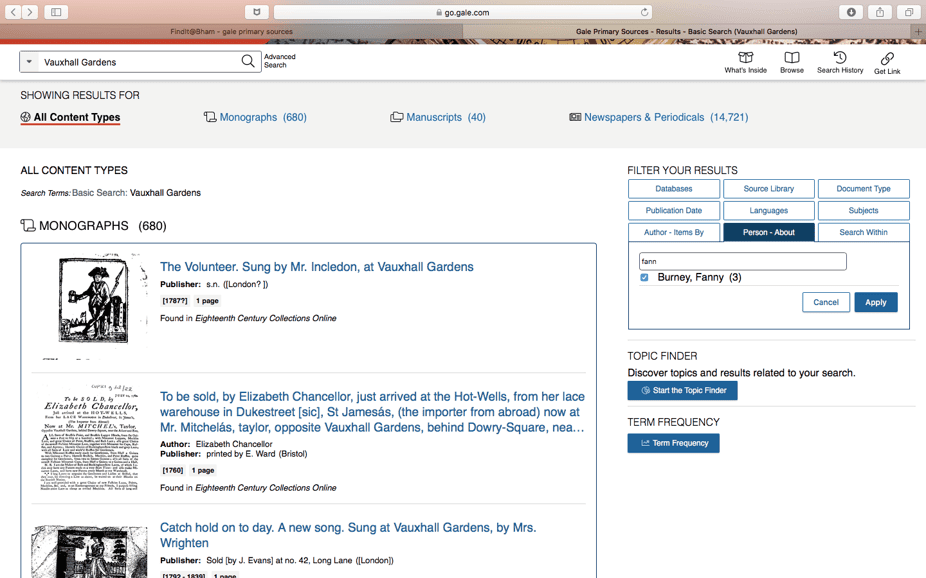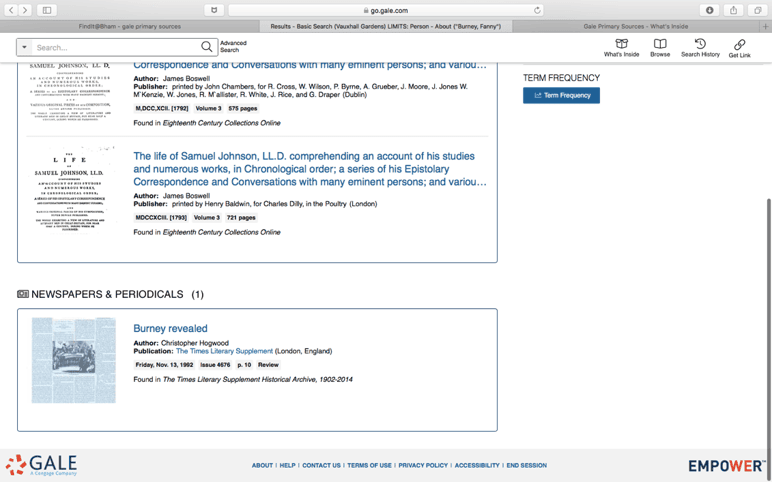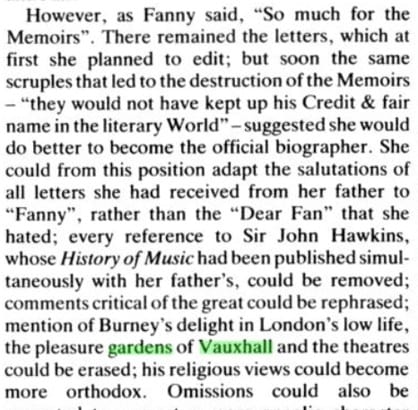│By Lily Deans, Gale Ambassador at the University of Birmingham│
Writing a dissertation is undoubtedly daunting, no matter how competent or confident you may feel by the time you proudly hand in the 12,000-word masterpiece! Just like writing a good essay, it is not just your own opinion that gets you the marks, but the opinions of others – and the way you use these opinions to either substantiate or contradict what you have said. So, naturally, the wider, more varied and unique the sources are that you use, the better awareness you will show of the existing discourse, and thus the more convincing your argument will be. “Ah yes,” I hear you say, “but where can I find these unique sources?” Well, with Gale Primary Sources, of course! This blog will show briefly the quantity and variety of sources I have found in Gale’s archives as I have been researching and writing my dissertation.
Vauxhall Pleasure Gardens in the Eighteenth Century
My dissertation is on the representation of Vauxhall Pleasure Gardens in the Eighteenth Century, and how, through prose and poetry, this fantastical, carnivalesque Garden was depicted. You’ve probably never heard of it before, and only know Vauxhall from the Victoria Line, but in the 1700s – 1800s (the time of Wordsworth, Keats and Byron), it was a botanical escape in the middle of Vauxhall, where anyone and everyone could go and visit for just six shillings. Gale Primary Sources has a multitude of information, spanning a variety of topics and time periods, and luckily for me, Vauxhall Gardens is covered extensively. I first wanted to do some general research, before I pinned down a specific topic, so, opening Gale Primary Sources from my library catalogue, I searched “Vauxhall Gardens”.

Focusing my search results using the filters
As you can see in the screenshot above, there are 680 monographs, 40 manuscripts and 14,721 newspapers and periodicals all relating to “Vauxhall Gardens”. This is a clear indication of the quantity of sources Gale makes available for the perusal of students like me. However, it would take months to go through all those different types of sources, and unfortunately, as an undergraduate, I don’t have that much spare time to sift and read through all these (of course undoubtedly interesting and fruitful) sources! So, to make life easier for me, I narrowed my search down some more…
One of the novels I chose to analyse in my dissertation is Evelina, by Frances Burney. I read this in second year as part of my ‘Stories of the Novel’ module and it was this text that introduced me to Vauxhall Pleasure Gardens, as Burney’s protagonist, Evelina, goes to visit. I wondered if Frances Burney and Vauxhall Gardens are linked in some way, as this information would be extremely useful to substantiate my dissertation. To find Burney-related sources under my generalised search, I used the ‘Person – About’ filter:

A range of critical opinions
After this search, the sources were narrowed down to three (from the thousands I had just moments ago), and I was able to look more clearly at what they were and how they could be useful to me. I was presented with two monographs from Eighteenth Century Collections Online, which were both personal accounts from the critic Samuel Johnson, a friend of the Burneys. (On a side note, the ECCO archive is absolutely crucial for me, as it allows me to explore all of the eighteenth century, and seeing as my English Literature dissertation is focused on novels of this period, it goes without saying I’ll be using this archive a lot!) The remaining source was a newspaper article, written in 1992 by Christopher Hogwood in The Times Literary Supplement Historical Archive, titled “Burney Revealed”.


What I can now depict from this source is why Frances Burney may have chosen to use Vauxhall Gardens as a setting for her novel. Including a twentieth-century critical opinion shows variety and multitudes in my analysis, and this gives my argument more credibility. Interestingly, Hogwood’s piece suggests Fanny wanted to remove her father’s “delight in London’s low life” and “the pleasure gardens of Vauxhall” from his biography, suggesting the two are related in some way. However, this attitude towards the Vauxhall Pleasure Gardens seems to go against Fanny’s portrayal of Evelina in her novel, thus I have found a dichotomy of representation which would be a perfect way to form an argument in my dissertation.
Something for everyone – make your dissertation stand out!
Naturally, I assume not all of you reading this will care as much as I do about Vauxhall Pleasure Gardens in the Eighteenth Century, and I don’t expect you to either! However, with this blog post I wanted to demonstrate just how easy it is to get your hands on a range of unusual, unique or niche sources that will make your dissertation stand out. There are a multitude of avenues to explore, as a result of the endless topics, people, places and time periods covered in Gale Primary Sources. A great way to start is to search generally, and see what comes up; from there you can narrow the search results down, and I bet you’ll find something that could help make your dissertation a First Class piece of work!
Studying eighteenth-century social history? Interested in finding more primary sources? It’s not only novels in Eighteenth Century Collections Online. Check out: ‘Ice Cream Recipes in Gale’s Eighteenth Century Collections Online‘ or ‘Fashion and the Eighteenth-Century Public Sphere: from Tatler to Twitter‘.
Blog post cover image citation: Thought Catalog @thoughtcatalog (www.quotecatalog.com) on Unsplash.com

